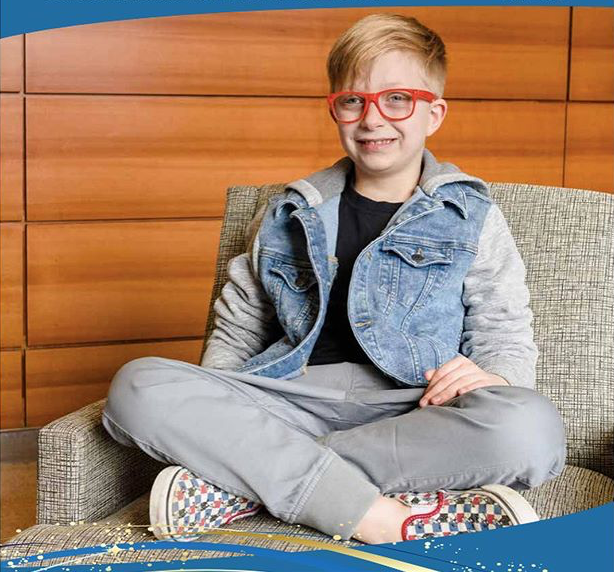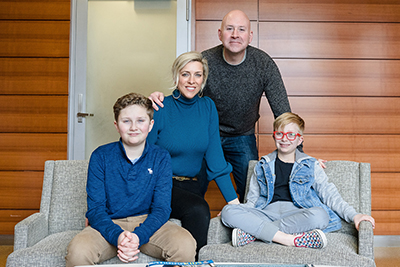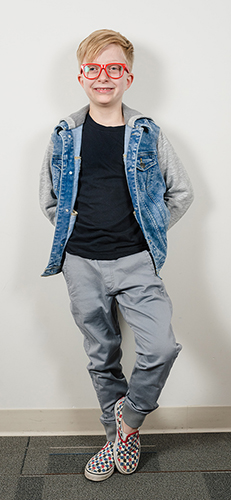Jack Harrison
A Journey Home to Rochester Brings Successful Treatment for Brain Tumor
Jack Harrison’s first symptoms seemed innocuous enough. The 6-year-old was reluctant to climb onto the swings at the playground, and his motor skills slipped slightly. His parents, Rochester natives Eric and Sara Harrison, had just moved the family from Texas to Germany, where Eric, a U.S. Army officer, had been stationed. Maybe Jack was just having trouble adjusting, they reasoned.
 When Jack’s teacher sent home before-and-after handwriting samples, however, the change was unmistakable, and alarming. Doctors quickly ordered an MRI. The Harrisons received the grim results on May 24, 2018.
When Jack’s teacher sent home before-and-after handwriting samples, however, the change was unmistakable, and alarming. Doctors quickly ordered an MRI. The Harrisons received the grim results on May 24, 2018.
“Their English wasn’t really up to par, and all they kept saying was, ‘He has a brain tumor, we’re sorry,’” Eric Harrison recalled. “They kept saying, ‘We’re sorry.’”
“It was like living in a vortex for the next number of weeks as we kept learning more and more about the tumor,” Sara Harrison said.
It was the beginning of a long journey, which eventually led them to Golisano Children’s Hospital, where doctors, nurses and support staff helped the family fight Jack’s cancer.
“I always say that the oncology team are the people you never want to make friends with — but, oh my God, they were our first and best friends when we came to Golisano, and they’ll be our family forever,” Sara Harrison said.
Coming Home to Rochester
Jack was diagnosed with an astrocytoma, one of the more common types of brain cancer, and the tumor was lodged deep in the middle of his brain. One German doctor thought he could operate. Others advised against it. Knowing they needed a second opinion, the Harrisons initially turned to the Children’s Hospital of Philadelphia, which confirmed the tumor was inoperable.
The doctors in Philadelphia suggested a 60-week chemotherapy regimen, the standard treatment for the type of tumor Jack had. But the Harrisons wanted Jack treated in Rochester, where they had a strong support network. Phone conversations with David Korones, M.D., professor of Pediatrics, Oncology and Neurology at the Golisano Children’s Hospital, clinched it. Korones, who also recommended the 60-week chemotherapy plan, became both the guiding force in Jack’s treatment and a constant source of reassurance to the family.
“Dr. Korones was wonderful from the beginning,” Sara Harrison said. “He told us, ‘When you get here, everything will be all right — just worry about getting here.’ He was a calming voice the whole way through.”
The Harrisons needed that source of calm. While the Army provided Eric Harrison with a quick transfer, Jack continued getting worse as the family packed up, moved and settled in Brighton. He was unable to attend school full time. His vision deteriorated, and he stared falling down. Climbing stairs or getting into a car without help became impossible. In November 2018, he was given a wheelchair.
“We were seeing his motor skills deteriorate one by one,” Sara Harrison said.
 Fighting Back
Fighting Back
Golisano Children’s Hospital sees about 20 to 30 children with newly diagnosed brain cancer every year, and about 10 to 15 of them have astrocytomas. The tumors respond well to radiation, but that type of therapy can have a longstanding impact on young children’s ability to learn and process, so they are often treated with chemotherapy, Korones said. Jack received a combination of two drugs, carboplatin and vincristine, which have a good track record against astrocytomas.
But that didn’t mean the treatment was easy, or fast.
As sometimes happens, Jack continued getting worse during the first few weeks of his treatment. The turning point came after a scan revealed excess fluid on his brain, a condition called hydrocephalus.
“The tumor was choking off the normal drainage channel, causing Jack’s ventricles to swell,” said Howard Silberstein, M.D., professor of Neurosurgery, Orthopaedics, Pediatrics and Neurology. “The swelling puts pressure on nearby areas of the brain, leading to headaches and other symptoms.”
In May 2019, Silbertstein performed a procedure called an Endoscopic Third Ventriculostomy, which involves creating a new opening at the base of the third ventricle through which fluid can drain.
“The result is that the patient feels better, and the headaches go away,” Silberstein said. “The brain functions better.”
Jack — the old Jack — began coming back. His cognition improved. And not only that: His chemotherapy regimen began shrinking the tumor. By June, Jack could not only get in the car by himself but buckle his own seatbelt. His mom cried each time she heard it click.
“It’s the little victories that you celebrate,” she said. “Summer swimming. Getting on the school bus. Things I thought he would never do again.”
Through it all, the Harrisons remained steadfast.
“I was deeply impressed with the family,” Korones said. “They kept level heads despite what can be an overwhelming experience, and they were zealous advocates for Jack.”
Encouraged by Golisano nurses and support staff, Jack also became an advocate for himself. When he let them know he didn’t like the smell of alcohol wipes, for example, they gladly let him wear a mask.
 Returning to Life
Returning to Life
On Nov. 21, Jack finished his final infusion. His mother remembers the moment.
“Jack, that’s it,” she told him. “That’s it?” he replied incredulously. “I’m done?”
If there was any doubt, it was dispelled when about 60 people, including family, friends and members of Jack’s care team, gathered in the lobby to watch Jack ring the chemo bell. The Harrisons had a lot to celebrate, then and now. While Jack’s tumor is still present, it shrank significantly during treatment, and his first follow-up scan showed that it was stable. He’ll return for more scans every three months, but in the meantime, he’s started second grade, and resumed the activities typical of the energetic 8-year-old he’s become.
“He’s a completely new kid,” Eric Harrison said. “We call him Jack 2.0. He’s sledding with his brother. He snowboarded last week.”
“He’s taking advantage of everything,” Sara Harrison said. “He’s in a play, he’s going to take guitar lessons soon, and he aspires to be a singer-songwriter when he grows up. I can’t wait to see what he does, because if he can overcome this, he can do anything — and he will do it with empathy because he has walked in these shoes.”
Meanwhile, the family has been able to settle in Rochester for the long-term, buying a home in Fairport, meaning Jack will continue to see the care team that made his recovery possible. For that, they are grateful — and not only because of doctors like Korones.
“Child life specialists worked with Jack, and nurses helped us navigate the process,” Sara Harrison said. “I couldn’t have gotten through this without having the guiding light that we did in the nurses.”
Korones, meanwhile, sees a bright future for Jack, with many effective treatments available if the tumor ever does start to grow again. URMC physicians often see positive outcomes with patients like Jack, but the degree to which he has recovered delights his care team.
“We couldn’t be sure we’d get him back to where he was,” Korones said. “Outcomes like this really help me appreciate the beauty of the simple things in life — just seeing him walk into clinic unassisted, for example.”
For Jack, the return to school has been the best part. He likes having more time for friends and being able to explore his interests. But like his parents, he misses the members of his care team who became a second family, and he has simple message for them: “I love you.”